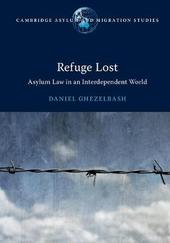
|
Refuge Lost: Asylum Law in an Interdependent World
Paperback / softback
Main Details
| Title |
Refuge Lost: Asylum Law in an Interdependent World
|
| Authors and Contributors |
By (author) Daniel Ghezelbash
|
| Series | Cambridge Asylum and Migration Studies |
|---|
| Physical Properties |
| Format:Paperback / softback | | Pages:234 | | Dimensions(mm): Height 247,Width 174 |
|
| ISBN/Barcode |
9781108441414
|
| Classifications | Dewey:342.083 |
|---|
| Audience | | Professional & Vocational | |
|---|
| Illustrations |
Worked examples or Exercises; 4 Tables, black and white; 1 Line drawings, black and white
|
|
Publishing Details |
| Publisher |
Cambridge University Press
|
| Imprint |
Cambridge University Press
|
| Publication Date |
22 February 2018 |
| Publication Country |
United Kingdom
|
Description
As Europe deals with a so-called 'refugee crisis', Australia's harsh border control policies have been suggested as a possible model for Europe to copy. Key measures of this system such as long-term mandatory detention, intercepting and turning boats around at sea, and the extraterritorial processing of asylum claims were actually used in the United States long before they were adopted in Australia. The book examines the process through which these policies spread between the United States and Australia and the way the courts in each jurisdiction have dealt with the measures. Daniel Ghezelbash's innovative interdisciplinary analysis shows how policies and practices that 'work' in one country might not work in another. This timely book is a must-read for those interested in preserving the institution of asylum in a volatile international and domestic political climate.
Author Biography
Daniel Ghezelbash is a senior lecturer at Macquarie Law School, Sydney, Australia, where he teaches and researches in the areas of refugee and immigration law, human rights and administrative law. He is a practicing refugee lawyer and the director and founder of the Macquarie University Social Justice Law Clinic.
Reviews'People are on the move, and this book shows how desperate policy-makers ply the international market for laws and policies which might be borrowed and adapted to their own illusory goals of deterrence and control. In jurisdictions insufficiently attuned to the rule of law and democratic accountability, this leads too often, not to meaningful solutions for those in search of refuge, but to almost total disregard of their fundamental humanity, and to lasting damage to the lives, health and well-being of men, women and children at risk. With international institutions and principles under threat and legal black holes on the rise, Dr Ghezelbash's analysis provides a critical foundation for restoring credibility and protection.' Guy S. Goodwin-Gill, University of New South Wales, Kaldor Centre for International Refugee Law and All Souls College, Oxford 'This is a powerful and timely expose of how and why governments around the world are adopting restrictive laws and policies for asylum seekers and their families. The author gives rigorous and scholarly attention to the harsh measures that have been adopted, their devastating impact on vulnerable people and their debasement of the Good Samaritan purposes of international refugee law. Hopefully, it will contribute to a timely turnaround from the current dark chapter in local and international refugee law and policy.' The Honourable Michael Kirby, AC CMG, Justice of the High Court of Australia (1996-2009) and Co-Chair, IBA Human Rights Institute 'This book explores a significant and somewhat overlooked dark side of transnational cooperation, namely how states take inspiration from each other when designing ever-more draconian responses to block and deter refugees from accessing their territories. In this path-breaking and innovative study, Daniel Ghezelbash develops a sophisticated framework for understanding immigration policy transfers and the troubling implications of this kind of state practice for international refugee law.' Thomas Gammeltoft-Hansen, Raoul Wallenber Institute of Human Rights and Humanitarian Law and Aarhus University, Denmark 'Ghezelbash has written the definitive account of how ideas about controlling asylum seekers spread across countries and the effects of that diffusion. Refuge Lost is a cautionary tale showing that policies created behind the scenes and carried out in secrecy are undermining the protection of those vulnerable to violence.' David Scott FitzGerald, University of California 'Refuge Lost addresses an issue of great contemporary significance to domestic policy makers and legislators and to the international community as a whole, namely the 'transfer' of restrictive immigration policies between jurisdictions. By combining a sophisticated theoretical framework and innovative methodology this book makes a significant contribution to our understanding of the process behind such policy transfers in recent years. I highly recommend this book to scholars, students, decision-makers, policy-makers, and all those interested in understanding in greater depth the limits and challenges to upholding principles of refugee protection today.' Michelle Foster, University of Melbourne 'This is a really excellent book on a very topical theme. More aggressive measures to repel and control the movement of asylum seekers and migrants are becoming common. These include long-term detention, offshore processing and maritime interdiction. The United States and Australia provided the test-bed for these practices which, in many cases, contravene international law. The author demonstrates with great clarity, balance and commitment the ways in which these interventions have been possible in mature democracies with apparently strong legal systems. Its analysis of the concept of legal transfers provide deeper foundations for the excellent examination of the relevant case-law. I recommend the book highly.' Daniel Wilsher, City University London 'Refuge Lost provides an invaluable aid to our understanding of the way in which US, Australian, EU and global refugee policy has evolved over the past 30 years. It is meticulous in its scholarship, exhaustive in its sources and written in a way that will meet the needs of legal scholars, members of the refugee studies community as well as asylum advocates and practitioners.' Jeff Crisp, Journal of Refugee Studies
|